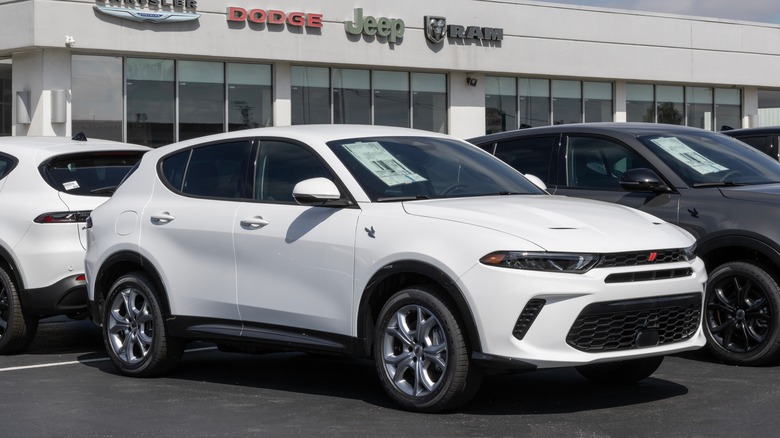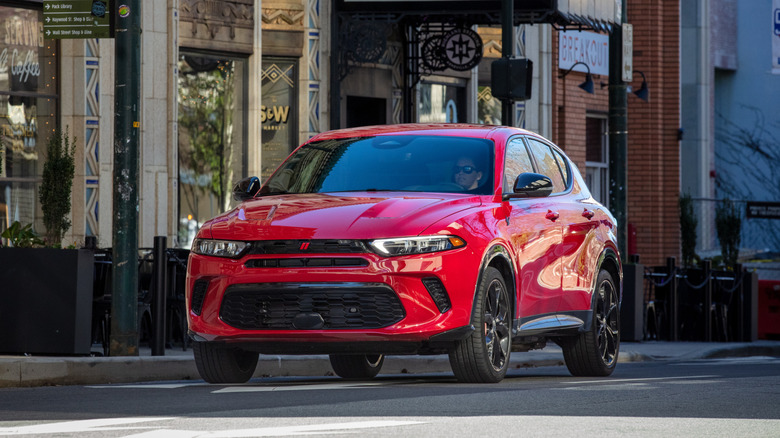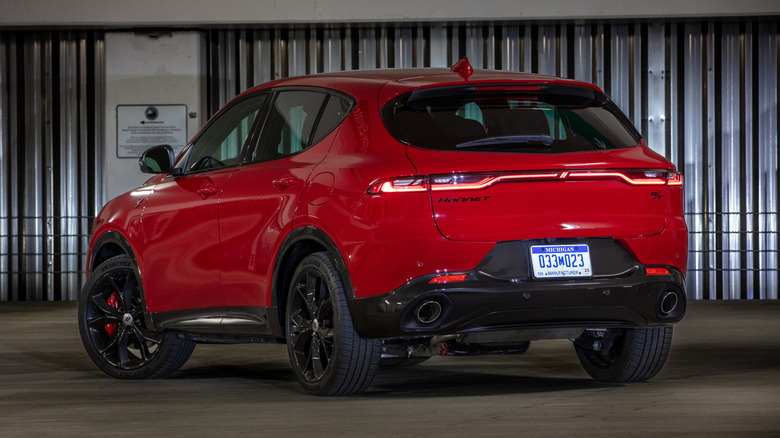How Fast Is The 2025 Dodge Hornet Hybrid? A Look At Its Top Speed And HP
The Dodge Hornet has had its fair share of recalls and owner complaints. But, with the 2025 model, the manufacturer seems to be heading towards a brighter future. How does this new model fare in terms of speed? Dodge claims the Hornet R/T plug-in hybrid can sprint from 0-60 mph in 5.6 seconds with its PowerShot feature engaged.
This extra boost unlocks 30 horsepower temporarily by pulling both paddle shifters, giving the Hornet its quickest acceleration. Without PowerShot, the R/T clocks 0-60 mph in about six seconds, nearly identical to the non-hybrid GT model. Top speed is capped at 128 mph, a respectable figure for a compact SUV, but nothing that will set track records.
The Hornet Hybrid's powertrain combines a turbocharged 1.3-liter four-cylinder engine driving the front wheels and an electric motor powering the rear, for a combined output of 288 horsepower and 383 lb-ft of torque. That figure sounds strong, and it is, but in everyday driving, the difference between the hybrid R/T and the gas-only GT isn't as dramatic as the specs suggest.
While the Hornet Hybrid feels lively around town, buyers expecting neck-snapping hybrid acceleration might find the performance gain underwhelming unless they frequently use PowerShot. It's a quick SUV for its size, but don't expect it to feel like a true performance crossover.
The 2025 Hornet R/T faces tough rivals
On paper, the hybrid Hornet R/T's numbers look great for a plug-in compact SUV, easily outgunning hybrid rivals like the Hyundai Tucson Hybrid and Kia Sportage Hybrid. However, the Hornet's price point – starting at $43,240 and climbing past $48,585 for the R/T Plus – puts it uncomfortably close to premium crossovers like the BMW X1 and Audi Q3. Meanwhile, its 0-60 mph sprint matches the Alfa Romeo Tonale, which isn't surprising, given the two share most of their hardware.
Where the Hornet Hybrid stumbles is in value per performance. Despite its higher price tag, it doesn't outpace the cheaper Hornet GT by a meaningful margin. The GT, powered by a 2.0-liter turbo-four making 268 hp, hits 60 mph in about 6.1 seconds, just half a second slower.
That means, unless you specifically need the R/T's 30+ miles of electric-only range, the gas-powered Hornet GT Plus (which costs over $5,000 less) remains the better buy for most shoppers seeking punchy acceleration without the added weight and complexity of the hybrid system.
Fast enough, but not a game-changer for Dodge
The 2025 Dodge Hornet R/T hybrid brings strong numbers to the table, but it doesn't revolutionize the segment. Sadly, none of those stats translate into a driving experience that leaps ahead of competitors, or even its own cheaper sibling. Add in a cramped rear seat, limited cargo space, and a high starting price, and the Hornet Hybrid starts to feel more like a niche pick rather than a mainstream hit with its audience.
Still, for buyers prioritizing style and a dash of performance, the Hornet R/T hybrid delivers enough punch to satisfy. It feels sharper than the average Sportage or Tucson Plug-in on twisty roads, and it carries Dodge's muscle car DNA better than most would expect from a compact SUV. But if pure speed and value are your top priorities, the GT model or a competitor like the Mazda CX-5 Turbo might make more sense.


